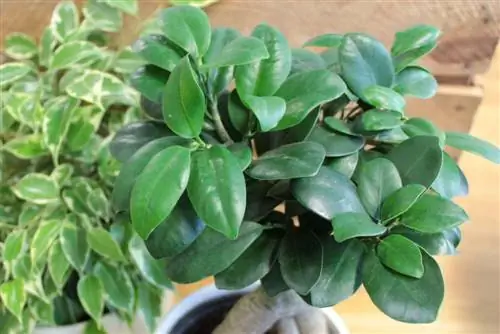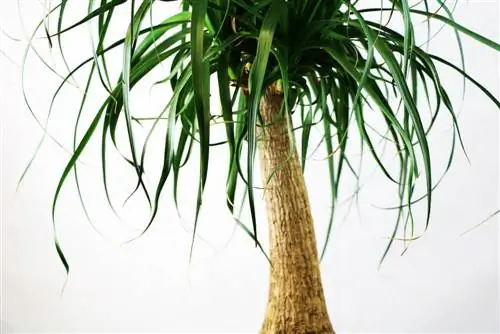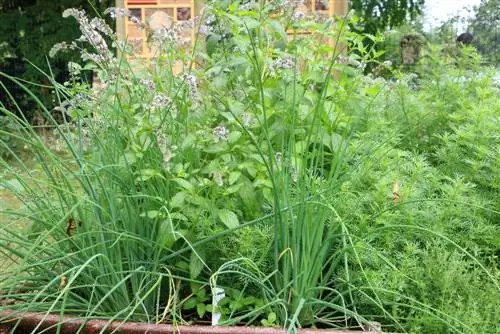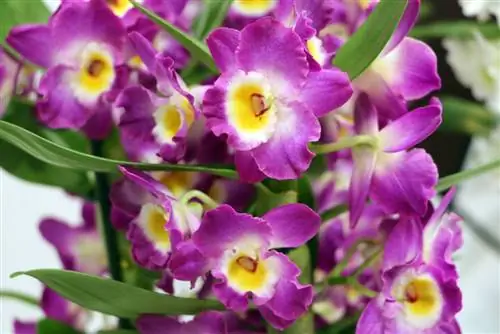- Author admin caroline@plants-knowledge.com.
- Public 2023-12-17 03:39.
- Last modified 2025-01-24 12:45.
All plants carry out photosynthesis. Under the influence of brightness, they remove carbon dioxide from the air and excrete oxygen in return. No photosynthesis occurs in the dark. Spent air is then not exchanged for oxygen-rich air. Plants are more likely to absorb oxygen at night. However, the value is so low that the air quality in the bedroom cannot be affected. Contaminated potting soil is more likely to cause problems. Bacteria and mold spores in potting soil, which can cause allergies, are particularly worrying. People with allergies should not place plants in their bedrooms. For everyone else, plants improve the quality of living.
Plants for the bedroom
Apart from flowering plants, you can put any plants in the bedroom that can tolerate temperatures around 18 °C, because the bedroom is often cooler than other rooms. Brightness also plays a role when choosing plants for the bedroom. You should avoid strongly scented plants as much as possible. The scent of flowers is a frequent trigger for morning headaches. However, green plants and palm trees are well suited for the bedroom. Palm trees look very decorative thanks to their impressive fronds. Decorative foliage plants improve air quality by increasing humidity. Plants that need a rest period in cool temperatures are also in good hands in the bedroom. Some species filter pollutants from the air that enter the air through carpets, tobacco smoke or furniture. The spider plants and the dragon tree filter formaldehyde from the air. Ivy can break down benzene.
Palm trees in the bedroom
Palm trees create a cozy Mediterranean atmosphere. The dwarf date palm is an excellent houseplant for the bedroom. It needs at least 16 °C room temperature and likes to be in the shade. The umbrella palm Livingstonia, on the other hand, can cope with 12 °C to 14 °C if it is given a spot in full sun. Despite its appearance, the dragon tree is not a palm tree, but rather a member of the agave family. It loves a bright but not sunny location and temperatures around 18 °C all year round. The cycad, Cycas revolute, thrives in a partially shaded spot at 15°C to 18°C. It also grows very slowly. For the Phoenix Plame, however, the bedroom is the right place to overwinter. It should hibernate at around 10 °C in winter. The yucca palm with its long sword-shaped leaves can stay cool all year round. It is particularly suitable for the bedroom.
Green plants for bright bedrooms
The Dieffenbachia does well in the bedroom if the watering rhythm is adjusted to the cooler temperatures. Because the green plant doesn't like waterlogging. The leaf ornamental plant requires a bright and not sunny location. If you are looking for an unusual ornamental plant for your bedroom, then an indoor fir is an option. It tolerates the climate of cool rooms well.
Tip:
Turn the fir tree often so that it doesn't grow crooked.
Ferns for the bedroom
Ferns thrive in high humidity. However, some types are also suitable for the bedroom. These species decorate the bedroom:
- Deertongue fern for bright, cool rooms
- Shield fern for bright, cool rooms
- Rib fern for a partially shaded location
Tip:
If a fern requires high humidity, a humidifier can be placed in the surrounding area.
Multitalent Ficus

The rubber tree also feels at home in bedrooms at home. The Ficus genus includes up to 800 species. Around 20 species are cultivated. Ficus species require a bright but not sunny place. Location and temperatures that do not fall below 15°C. The rubber tree is particularly widespread with oval leaves arranged in pairs and can grow up to the ceiling. The birch fig, Ficus benjamini, is particularly decorative due to its many small leaves. The birch fig grows bushy like a small tree and looks particularly delicate due to its many small leaves. These can be completely green or edged with white. Like a palm tree, the birch fig is a special eye-catcher in the bedroom. The Ficus pumila has a completely different growth habit. Its shoots hang down from above like a waterfall. It is well suited for a hanging basket.
For dry climates
Aloe vera, which is known as a medicinal plant and acts as a moisturizer in many skin care products, likes a dry, cool climate in the brightest possible sunny location. The succulent green plant forms rosettes with its thick, fleshy leaves. Particularly low species are suitable for the room, such as Aloe humilis with a wide variety of leaf shapes and colors or Aloe striata with striped leaves. Bow hemp is one of the agave plants. Also known as Sansiveria, it grows best at room temperature. Its leaves grow upright and have a sword-shaped shape. Bow hemp is considered to be very robust and is well suited for beginners.
Hydroculture as an alternative to soil
To avoid he alth problems caused by potting soil, plants can be kept hydroponically in the bedroom. Many green plants and palm trees are suitable for hydroponics. In hydroponics, the planting substrate is a mineral substrate made of stones or expanded clay.
Tip:
Mineral substrates are heavier than expanded clay. They give the plant more support!
A hydroponic container always consists of two containers. The plant sits in the inner container. The water supply is stored in the outer container. Young plants tolerate a change from soil to hydroponics better than older plants. Even palm trees that are sensitive to care errors often do better in hydroponics. By the way: Hydroponics produces neither fungi nor harmful germs.
Frequently asked questions
What are the basic things to consider when it comes to houseplants in the bedroom?
Regular ventilation and sufficient brightness have a positive effect on the growth of green plants.
Are there plants that also absorb carbon dioxide at night?
Yes, bow hemp, aloe, orchids and bromeliads also produce fresh air at night and absorb carbon dioxide.
How can mold be eliminated from potting soil?
Mold is caused by moisture. If the potting soil is moldy, plants should be urgently repotted and the plant pot replaced with a new planter. Drainage can prevent mold.
What other advantages does hydroponics bring?
The plants don't need to be watered as often. This is particularly advantageous during the holiday season.
Things to know about plants in bedrooms
Basically there is nothing wrong with palm trees and plants in the bedroom. The only problem is the potting soil. It is an ideal breeding ground for germs, fungi and bacteria. Mold formation and germs can potentially lead to allergies, which is why potting soil poses a certain he alth risk. For this reason, allergy sufferers should generally avoid plants in the bedroom. Flowering plants that have a very strong scent can also cause headaches and are therefore not suitable for bedrooms.
- Green plants can, however, have a very positive influence on the indoor climate. Plants with large leaves in particular also humidify the air. This ensures optimal humidity and he althy sleep.
- Furthermore, plants produce oxygen and thereby improve the air we breathe. Negative factors such as lack of oxygen and overheated rooms lead to dizziness, fatigue and headaches.
- Bedrooms are the ideal location for many plants because it is cooler here. During dormancy, a plant needs low temperatures and little water.
- Ideal bedroom plants include birch figs, yucca palms, palm lilies, firs and myrtle. But indoor ivy, climbing figs, Russian wine, indoor ferns and bobs are also suitable for the bedroom.
Nevertheless, it is often discouraged to put plants and palm trees in the bedroom. Green plants are generally harmless to he alth. That's why everyone should decide for themselves whether they want to do without plants in the bedroom or not.
In addition to their many positive properties, houseplants also provide visual rest points in the living and sleeping areas. This leads to increased well-being and more balance. Various scientific studies have proven the positive effects of houseplants in rooms. For this purpose, the room temperature, air humidity, noise and pollutant levels were measured in planted and unplanted rooms. The research has shown that plants have a particularly positive effect on the indoor climate and increase general well-being. The efficiency of plants and palm trees should not be underestimated. They not only have a positive effect on living rooms and bedrooms, but also on classrooms and offices.






